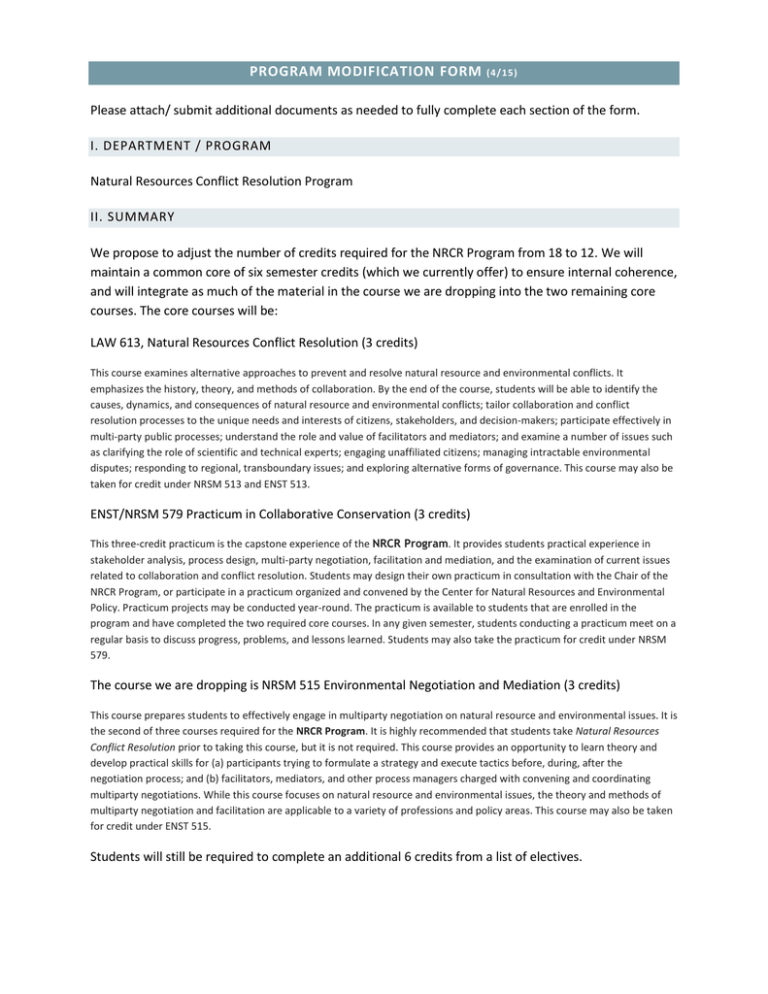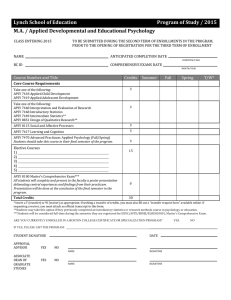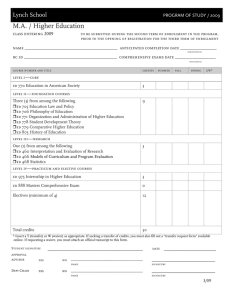PROGRAM MODIFICATION FORM
advertisement

PROGRAM MODIFICATION FORM (4/15) Please attach/ submit additional documents as needed to fully complete each section of the form. I. DEPARTMENT / PROGRAM Natural Resources Conflict Resolution Program II. SUMMARY We propose to adjust the number of credits required for the NRCR Program from 18 to 12. We will maintain a common core of six semester credits (which we currently offer) to ensure internal coherence, and will integrate as much of the material in the course we are dropping into the two remaining core courses. The core courses will be: LAW 613, Natural Resources Conflict Resolution (3 credits) This course examines alternative approaches to prevent and resolve natural resource and environmental conflicts. It emphasizes the history, theory, and methods of collaboration. By the end of the course, students will be able to identify the causes, dynamics, and consequences of natural resource and environmental conflicts; tailor collaboration and conflict resolution processes to the unique needs and interests of citizens, stakeholders, and decision-makers; participate effectively in multi-party public processes; understand the role and value of facilitators and mediators; and examine a number of issues such as clarifying the role of scientific and technical experts; engaging unaffiliated citizens; managing intractable environmental disputes; responding to regional, transboundary issues; and exploring alternative forms of governance. This course may also be taken for credit under NRSM 513 and ENST 513. ENST/NRSM 579 Practicum in Collaborative Conservation (3 credits) This three-credit practicum is the capstone experience of the NRCR Program. It provides students practical experience in stakeholder analysis, process design, multi-party negotiation, facilitation and mediation, and the examination of current issues related to collaboration and conflict resolution. Students may design their own practicum in consultation with the Chair of the NRCR Program, or participate in a practicum organized and convened by the Center for Natural Resources and Environmental Policy. Practicum projects may be conducted year-round. The practicum is available to students that are enrolled in the program and have completed the two required core courses. In any given semester, students conducting a practicum meet on a regular basis to discuss progress, problems, and lessons learned. Students may also take the practicum for credit under NRSM 579. The course we are dropping is NRSM 515 Environmental Negotiation and Mediation (3 credits) This course prepares students to effectively engage in multiparty negotiation on natural resource and environmental issues. It is the second of three courses required for the NRCR Program. It is highly recommended that students take Natural Resources Conflict Resolution prior to taking this course, but it is not required. This course provides an opportunity to learn theory and develop practical skills for (a) participants trying to formulate a strategy and execute tactics before, during, after the negotiation process; and (b) facilitators, mediators, and other process managers charged with convening and coordinating multiparty negotiations. While this course focuses on natural resource and environmental issues, the theory and methods of multiparty negotiation and facilitation are applicable to a variety of professions and policy areas. This course may also be taken for credit under ENST 515. Students will still be required to complete an additional 6 credits from a list of electives. III. ENDORSEMENTS AND APPROVALS Requestor: Signature: Matthew McKinney Date 1.16.16 Signature: Matthew McKinney Date 1.16.16 Phone 406.459.5166 Email: matthew.mckinney@umontana.edu Program Chair: Matthew McKinney *Other Affected Programs: Environmental Studies Program Signature _______________________Date____________ Department of Society and Conservation Signature _______________________ Date____________ School of Law Signature _______________________ Date____________ Dean: Signature _______________________ Date____________ * Are affected because: (a) required courses incl. prerequisites or corequisites, (b) perceived overlap in content areas, or (c) cross-listing of coursework IV. TYPE OF PROGRAM MODIFICATION Major Minor Option Teaching major / minor X Other, Please describe: Change to certificate program. V. CATALOG LANGUAGE Attach the current catalog language with the proposed changes clearly identified. VI. JUSTIFICATION We would like to expedite this change during the spring 2016 semester for the following reasons: 1. Consistency. This adjustment will make the requirements for this certificate program consistent Faculty Senate Procedure Number 301.10, which states that a graduate-level certificate “shall require a minimum of 12 semester credits.” 2. Lack of resources. We do not have the capacity to offer a third stand-alone common core course, which we have been doing for the past 5-6 years on a pro bono basis. We are in the process of integrating much of the material from that course into the two other core courses. 3. Timeliness. We would like to start the fall 2016 semester with a clean slate and to clarify and communicate the expectations and requirements for the certificate program. VII. SUBMISSION After all signatures have been obtained, submit original, and an electronic file to the Faculty Senate Office, UH 221. An electronic copy of the original signed form is acceptable.


